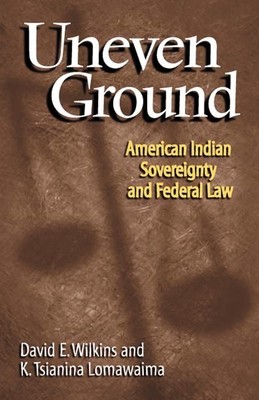
- We will send in 10–14 business days.
- Author: David E Wilkins
- Publisher: University of Oklahoma Press
- ISBN-10: 0806133953
- ISBN-13: 9780806133959
- Format: 14.8 x 21.5 x 2.5 cm, minkšti viršeliai
- Language: English
- SAVE -10% with code: EXTRA
Reviews
Description
In the early 1970s, the federal government began recognizing self-determination for American Indian nations. As sovereign entities, Indian nations have been able to establish policies concerning health care, education, religious freedom, law enforcement, gaming, and taxation. Yet these gains have not gone unchallenged. Starting in the late 1980s, states have tried to regulate and profit from casino gambling on Indian lands. Treaty rights to hunt, fish, and gather remain hotly contested, and traditional religious practices have been denied protection. Tribal courts struggle with state and federal courts for jurisdiction.
David E. Wilkins and K. Tsianina Lomawaima discuss how the political rights and sovereign status of Indian nations have variously been respected, ignored, terminated, and unilaterally modified by federal lawmakers as a result of the ambivalent political and legal status of tribes under western law.EXTRA 10 % discount with code: EXTRA
The promotion ends in 22d.03:52:47
The discount code is valid when purchasing from 10 €. Discounts do not stack.
- Author: David E Wilkins
- Publisher: University of Oklahoma Press
- ISBN-10: 0806133953
- ISBN-13: 9780806133959
- Format: 14.8 x 21.5 x 2.5 cm, minkšti viršeliai
- Language: English English
In the early 1970s, the federal government began recognizing self-determination for American Indian nations. As sovereign entities, Indian nations have been able to establish policies concerning health care, education, religious freedom, law enforcement, gaming, and taxation. Yet these gains have not gone unchallenged. Starting in the late 1980s, states have tried to regulate and profit from casino gambling on Indian lands. Treaty rights to hunt, fish, and gather remain hotly contested, and traditional religious practices have been denied protection. Tribal courts struggle with state and federal courts for jurisdiction.
David E. Wilkins and K. Tsianina Lomawaima discuss how the political rights and sovereign status of Indian nations have variously been respected, ignored, terminated, and unilaterally modified by federal lawmakers as a result of the ambivalent political and legal status of tribes under western law.

Reviews